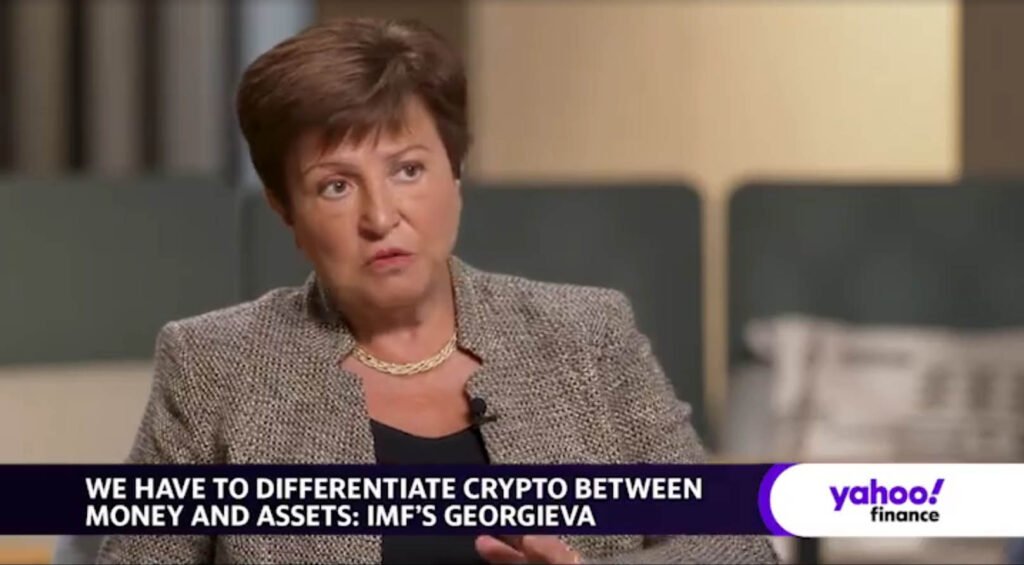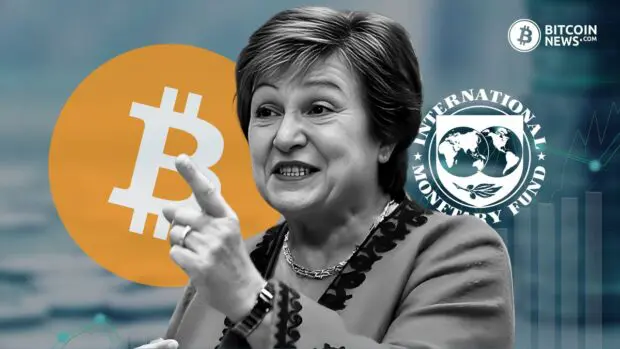In recent developments within the digital assets landscape, Kristalina Georgieva, the Managing Director of the International Monetary Fund (IMF), has shared her perspective on how she perceives digital assets and their role in the financial world.
Georgieva stated that she believes Bitcoin is not money, but that shouldn’t prevent people from diversifying their assets to include bitcoin. As the Bitcoin market experiences a significant moment with the approval of Bitcoin spot Exchange-Traded Funds (ETFs), Georgieva’s comments provide insights into the IMF’s stance on the matter.
Bitcoin: An Asset Class, Not Money
Georgieva’s key message is clear: Digital assets, particularly Bitcoin, should be seen as an asset class rather than a form of currency. In an interview with Yahoo Finance, she stressed the need to differentiate between money and assets when discussing Bitcoin. According to Georgieva, Bitcoin and other digital assets are more akin to money management funds, offering various levels of security and risk based on whether the digital assets are backed.

She said:
“Our view is that we have to differentiate between money and assets. When we talk about crypto, we are actually talking about an asset class. It could be backed up and in that sense, more secure and less risky, or it could be not backed up and, therefore, a riskier investment. But it is not exactly money. It’s more like a money management fund.”
IMF’s Caution Amid ETF Approval
Georgieva dismisses the possibility of Bitcoin posing a challenge to traditional currencies like the U.S. dollar, despite the recent approval by the U.S. Securities and Exchange Commission (SEC) for 11 spot Bitcoin ETFs, including those from notable entities such as Cathie Wood’s Ark and BlackRock.
She underlines the dominance of the dollar, supported by the size of the U.S. economy and the depth of its capital markets.
The approval of Bitcoin spot ETFs is considered a landmark day for the Bitcoin industry, opening doors for institutional investments and fostering mainstream acceptance. However, Georgieva’s reservations highlight the IMF’s stance on the current and future role of Bitcoin in the global financial system. The IMF chief believes that any scenario where Bitcoin would rival the dollar is a distant future concern, and not a pressing issue.
Kristalina Georgieva Calls for Clear Regulations
Georgieva’s recent comments align with her previous statements, emphasizing the need for clear regulations and robust infrastructure worldwide to mitigate the so called “risks” associated with digital assets. According to her, the IMF’s goal is to create a more efficient, interoperable, and accessible financial system while addressing the challenges posed by the increasing adoption of digital assets.
She mentioned she doesn’t see Bitcoin overthrowing the dollar anytime soon, adding:
“Look, this day, if it exists, is so far in the future that I think it is not very useful to talk about it. Why is the dollar today a dominant currency? Because of the size of the US economy and, most importantly, the depth of the capital markets in the US […] So I, for one, am not in a rush to turn my dollars into another currency. It doesn’t mean that you shouldn’t, you know, diversify. But, I wouldn’t worry too much about [bitcoin overthrowing the dollar]. There are things that make me lose sleep — that’s not one of them.”
This marks a softer tone in IMF Chief’s recognition of Bitcoin. In a recent announcement in October 2023, Georgieva stated that high bitcoin adoption could “undermine macro-financial stability.”
Back then, Georgieva stated:
“The challenge is that high crypto asset adoption could undermine macro-financial stability […] Our goal is to make a more efficient, interoperable, and accessible financial system by providing rules to avoid the risks of crypto, and infrastructure by leveraging some of its technologies.”
Analyst Advice: Embrace the Bitcoin Dip
In the midst of these developments, analysts like Gautam Chhugani from Bernstein offer advice to investors. Chhugani suggests viewing any minor selloffs in bitcoin as opportunities, emphasizing the potential for asymmetric upside for bitcoin in the near future. The approval of spot Bitcoin ETFs has fueled optimism, with experts anticipating increased investments in the Bitcoin market.
Chhugani Bernstein state:
“Our simple advice to all investors is — buy the dip and focus on the new bitcoin adoption cycle. The minor selloffs are opportunities in view of the asymmetric upside ahead,”
Alesia Haas, the Chief Financial Officer of Coinbase, sees the ETF approval as a catalyst that will attract trillions of dollars previously unable to access Bitcoin. While acknowledging the significance of the moment, Haas reminds the industry that this is just one step in the broader journey toward greater acceptance of Bitcoin.
She said:
“a landmark day for crypto […] but this is a long journey and this is just one step along the way, [Bitcoin ETF will] invite trillions of dollars that were previously not able to access crypto assets and not able to access bitcoin.”
Market Response and Future Outlook
Since the approval of the ETFs, Bitcoin has experienced a retracement, currently trading at the $43,300 level, representing a 6% decline over the past seven days. The long-term impact of the ETFs on Bitcoin’s price and the broader industry is yet to be determined.
While the approval of Bitcoin spot ETFs marks a significant milestone for the Bitcoin industry, the IMF’s chief reminds Bitcoiners that the journey toward widespread acceptance is still ongoing, and that skeptics are still vocal, even with an approval from the SEC.










